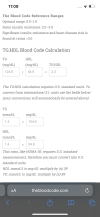You need to bear in mind that the conversion factor when moving from mmol/L to mg/dL is different for Triglycerides as it is for HDL and LDL. See how there are separate sections in the omnicalculator:

 www.omnicalculator.com
www.omnicalculator.com
If you’ve arrived at a ratio of one by using mmol/L but are then using reference ranges that were arrived at using mg/dL then you’re going to come a cropper. [I appreciate that anyone would think that the ratio would be unit agnostic, but don’t shoot the messenger.]
Carefully read this screenshot. I entered the values 1.4mmol/L in the lower part and it autofilled the upper part.


Convert Cholesterol Levels Measurement Units
Cholesterol unit calculator converts mg/dL to mmol/L for total serum cholesterol, HDL, LDL, and triglycerides.
If you’ve arrived at a ratio of one by using mmol/L but are then using reference ranges that were arrived at using mg/dL then you’re going to come a cropper. [I appreciate that anyone would think that the ratio would be unit agnostic, but don’t shoot the messenger.]
Carefully read this screenshot. I entered the values 1.4mmol/L in the lower part and it autofilled the upper part.



